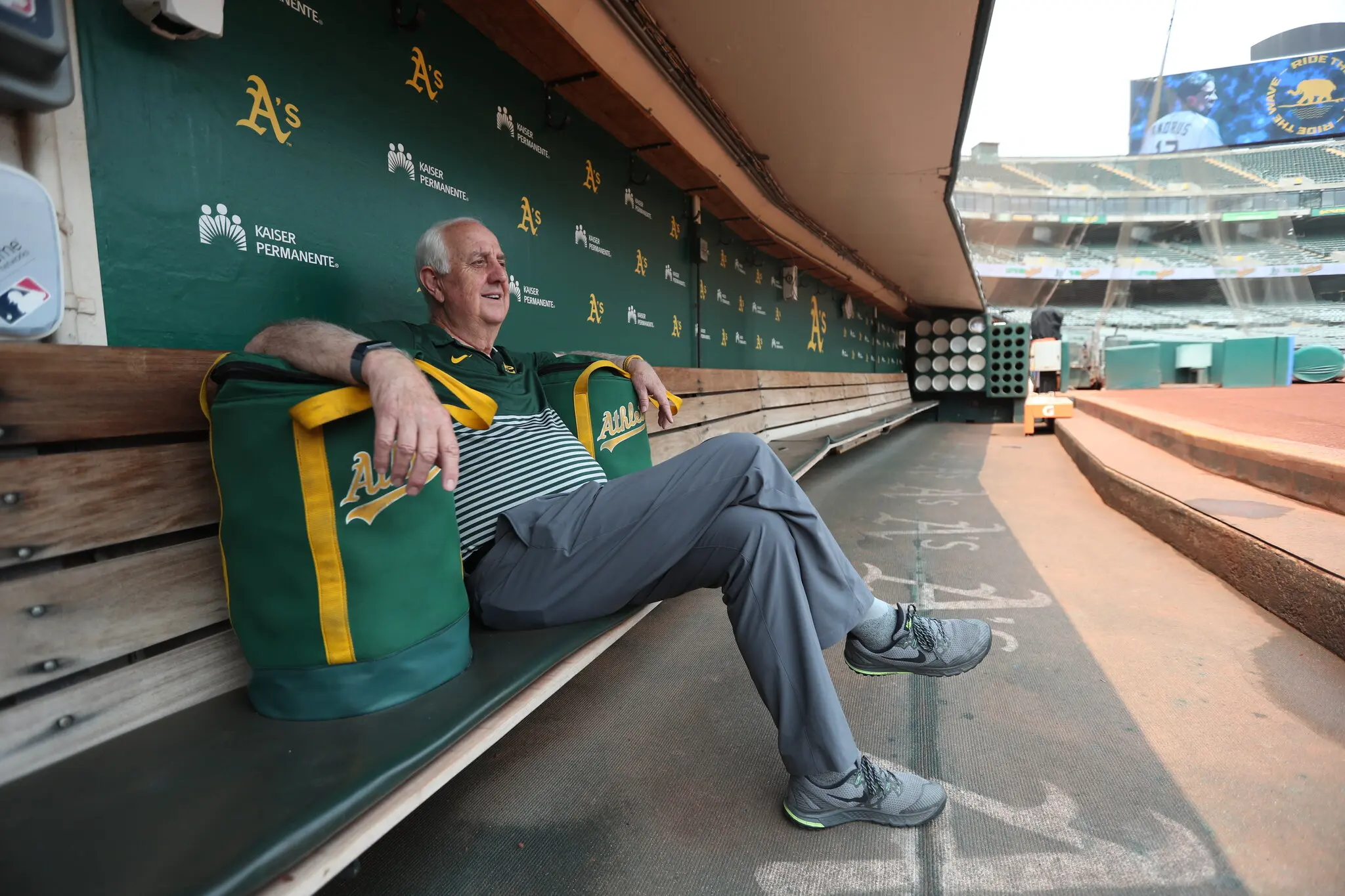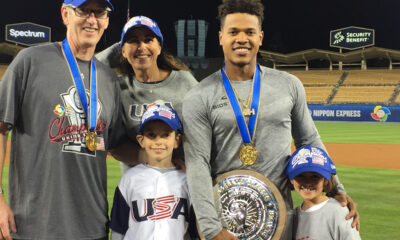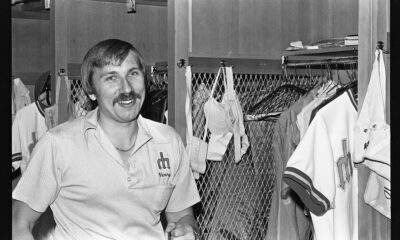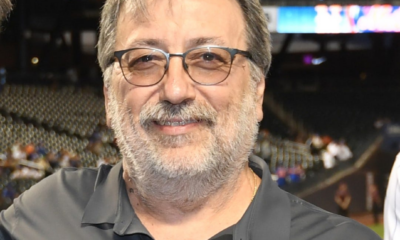By Jason Turbow
Aug. 26, 2021
Steve Vucinich’s 54th and final season with the Athletics has pushed the team’s equipment manager past Connie Mack for the longest run in franchise history. He has stories to spare.

Steve Vucinich has been around the A’s for so long, has known so many people and seen so many things, that when he starts talking about the old days, one story seems to flow into the next. It almost has to.
This year marks Vucinich’s 54th with the franchise — the team’s entire run in Oakland — and it vaults the A’s equipment manager ahead of the venerable Connie Mack when it comes to years of service with the team. Mack, of course, began managing the Philadelphia Athletics in the team’s inaugural season in 1901 and held the position for the next 50 years, abetted by the not-inconsequential detail that he was also the team’s owner (a role he continued until 1954 when he sold the debt-ridden franchise).
Should one manage to vault ahead of such a legend, one becomes, by way of the transitive property, a legend oneself. And legends have stories. If you’re lucky, you’ll get to hear some of them from Vucinich, one barely acknowledged transition at a time.
“Lew Krausse had one of the worst tempers ever,” said Vucinich, 69, one recent day from behind his desk at the Oakland Coliseum. “He’d take a bat to his locker and just hammer it, screaming. Catfish Hunter was the opposite. One time we were screwing around in the clubhouse, playing football. Cat was pulled from the game early; he snuck in and went, ‘Aha! Caught you!’ He was just so mellow even though he’d just gotten his ass kicked. Hunter’s best friend on the team was Paul Lindblad, a guy from Chanute, Kansas, an avid hunter and fisherman. That’s why they clicked. Paul was one of the first guys I ever saw run for exercise. He ended up playing in Texas, and he liked it so much that he stayed there and became a home builder. One time, a bunch of guys went deer hunting, and Paul takes his dog with him. Well, they got so far out, and here comes Paul two hours later carrying the dog. The dog got so tired he didn’t want to move, and Paul had to carry the dog the last two miles back. That was a guy in great shape.”
Eat your heart out, Connie Mack.
This season will be Vucinich’s final one with the A’s; in March he announced that, after spring training next year, he will finally retire. He’s already booked a summer cruise to Alaska, as if to protect himself from revisiting the decision.
‘He’s Catholic, Al. Hire Him.’
Through Vucinich’s decades with the A’s — during which his positions have included peanut vendor, ball boy, home clubhouse attendant, assistant equipment manager, visiting clubhouse manager and, since 1993, home clubhouse and equipment manager — he has seen the first major league game played in Oakland, two perfect games, five work stoppages and six World Series appearances. He watched the birth of the Swingin’ A’s, the advent of Billy Ball, the rise and fall of the Bash Brothers and the creation of Moneyball.
He has packed the team for one trip to Mexico and three to Japan, and twice visited Catfish Hunter’s farm in Hertford N.C. He’s been on hand for 21 postseason series (plus three wild-card play-in games) and four championships, mopping up more spilled champagne than a Times Square street cleaner on New Year’s Day.
In the process, Vucinich, who is called Vuc (pronounced “Voose”) by pretty much everybody, has become the institutional memory of his club.
“If you want to know any history about the Oakland Athletics, call Vuc,” said Ray Fosse, who played with the A’s from 1973 to 1975 and has been part of the team’s broadcast crew since 1986. “He knows it all because he’s seen it all.”
“People will tell you how Vuc is the historian of the organization,” added Billy Beane, the team’s executive vice president of baseball operations, “but that’s about 50th on the list of who he is and what he’s meant to the team.”
Vucinich is a local, born in Alameda, just across a narrow estuary from where the Athletics have played since arriving from Kansas City in 1968. He began hawking peanuts at the Coliseum in 1966 as a teenager, first for the Raiders and then, two years later, for the A’s. The latter job lasted all of four days, at which point one of the team’s clubhouse attendants unexpectedly quit. Vucinich descended into the depths of the Coliseum, glad-handing a security guard to gain access to the clubhouse office of the equipment man Al Zych. There, he lobbied Zych and a club vice president who happened to be making the rounds.
“What high school do you go to, kid?” asked Joe DiMaggio, the vice president in question.
“St. Joe’s,” said Vuc.
“He’s Catholic, Al,” the Hall of Famer said. “Hire him.”
Zych did as instructed. Vucinich still hasn’t left.
Vucinich’s parents did not approve of his promotion to clubhouse attendant, less because it distracted from his high school studies and more because it paid only $5 a day when pushing peanuts in the grandstand earned him closer to $20. For Vucinich, the money was incidental.
He became a salaried employee in 1974 when he was named visiting clubhouse manager, a promotion that inspired him to drop out of college. “It got me inside the gates,” Vucinich said. “Plus, it was a full-time gig with decent money.”
To describe the money as decent involved some hustle. Vucinich’s salary as a clubhouse manager, or clubbie — $300 per month — was decidedly not decent. But like all clubbies, he made plenty of extra cash through players who paid for services like food and laundry (in 1974 it was $5 per head, per day). Vucinich got to keep whatever remained after expenses. Those profits, plus tips for personal errands, could more than double his paycheck.
Special requests from players are an endless source of Vucinich’s stories. He found an after-hours birthday cake for Roger Clemens and once filled a steamer trunk with Coors for Carl Yastrzemski and Dwight Evans when they were unable to source the beer east of Kansas. (Modern versions of the same story involve procuring players wine from Napa and the occasional In-N-Out burger run.)
“It’s the toughest job in baseball, taking care of a bunch of prima donnas, each of whom has a different need and thinks he’s the best guy and expects you to take care of him right now,” said Sal Bando, captain of the three-peat championship A’s teams from 1972 to 1974. “The way Vuc has handled it all these years, it’s amazing.”
These days, the parameters of Vucinich’s position are more profound than ever. He arrives at the ballpark at about 10 a.m. for night games, and remains until things wrap up. He packs the team — communal equipment and individual gear alike — for every road trip. Whereas uniform orders once consisted of jerseys, pants and cotton undershirts, today they include throwback and alternate options, plus a broad array of performance gear. Then again, Vucinich no longer has to stock or clean ashtrays.
“Everything’s changing,” he said, “so you’d better get on board or you’re going to ride that pony out of the parking lot and not come back.”
Last season was particularly trying, with rigid coronavirus protocols affecting every level of clubhouse interaction. The M.L.B. procedure document Vucinich had to implement was 107 pages and covered everything from individual toiletries to pitchers keeping their own baseballs for bullpen use. Vucinich removed clubhouse furniture and transitioned the team’s dining facility outdoors, making do with a staff at two-thirds capacity given the strict limits on clubhouse personnel.
He endured. Vuc has made a career of enduring.
The Next Chapter
For Vucinich, an unexpected benefit of the pandemic was its serving as a dry run for retirement. The divorce rate among ballplayers seems to spike shortly after they quit, when their wives learn what it means to live with them full-time. Luckily for Vuc, Mrs. Vuc remains enamored of her husband.
In early February, 1989, Valerie O’Leary was a manager at the A’s spring training hotel. With players not scheduled to arrive for another couple of days, she found Vucinich and a scout as the only patrons at the bar. O’Leary, being the consummate hostess, comped them some drinks, leading her husband to joke ever since that “I met her when she was buying rounds for the house.”
The couple married in 1990, and three years later welcomed a daughter, Kayla. In 1996, when Kayla was three, she and her mother were watching the A’s on TV when the camera panned to Vuc in the dugout. “That’s Steve Vucinich,” Fosse said on the broadcast, “who says that it’s time for Kayla to go to bed now.”
The befuddled little girl could not understand why, when she waved to daddy, he would not wave back.
As Vucinich prepares for life at home full time, he still talks reverently about the clubhouse men who preceded him. He recalls listening to stories from Pete Sheehy of the Yankees, and the Kawano brothers — Yosh with the Cubs and Nobe with the Dodgers — and Mike Murphy, who has been with the Giants since 1958.
“Let me tell you about Butch Yatkeman, the equipment guy for the Cardinals,” Vucinich said, launching into another story. “When Butch retired, the players got him a first-class ticket anywhere he wanted to go on TWA. Well, he used it to go to Chicago to see the Cardinals. He could have driven there in three hours. He didn’t want to go anyplace else.”
So why quit? Vucinich is nearly 70, and is making more money than ever. Sort of. M.L.B.’s latest collective bargaining agreement, signed at the tail end of 2016, banned clubbie dues, which by that point had risen to $75 per player per day. The A’s balanced the discrepancy with a pay raise that, while not fully accounting for money lost, did just about double Vucinich’s base salary. For a man whose pension is based on his highest-earning years, this was significant.
His decision to retire is about more than money, though. Sometimes it’s just time.
Today’s players could be Vucinich’s grandchildren, a detail that is not lost on him. It also helps explain how he has managed to persevere. “A lot of guys in my position don’t last because they don’t want to change,” he said. “Well, players have changed, so I have to change, too. Believe it or not, it’s helped keep me young.”
Next spring, when Vucinich packs his own gear bag — long labeled No. 27, in honor of his favorite player, Catfish Hunter — for the final time, it will mark the end of the longest era in Athletics history.
“Vuc’s retirement still doesn’t seem real,” Beane said. “When he’s actually gone — when I walk into the clubhouse and he’s not there — it’s going to hit me harder than I think I’m admitting to right now. He just means so much to the team.”
Vucinich merely smiles at notions like this. He has trips to make with his family, and beers to drink with his pals in Arizona, where he has made his off-season home since 2001. And who knows? If the A’s buy him a plane ticket to travel anywhere he wants to go, he might just choose to fly a couple of hours north to watch a team he could never truly quit.

Clubhouse Manager of the Year

Tom McLaughlin Boston Red Sox Home Clubhouse Manager of the Year
Clubhouse Manager of the Year
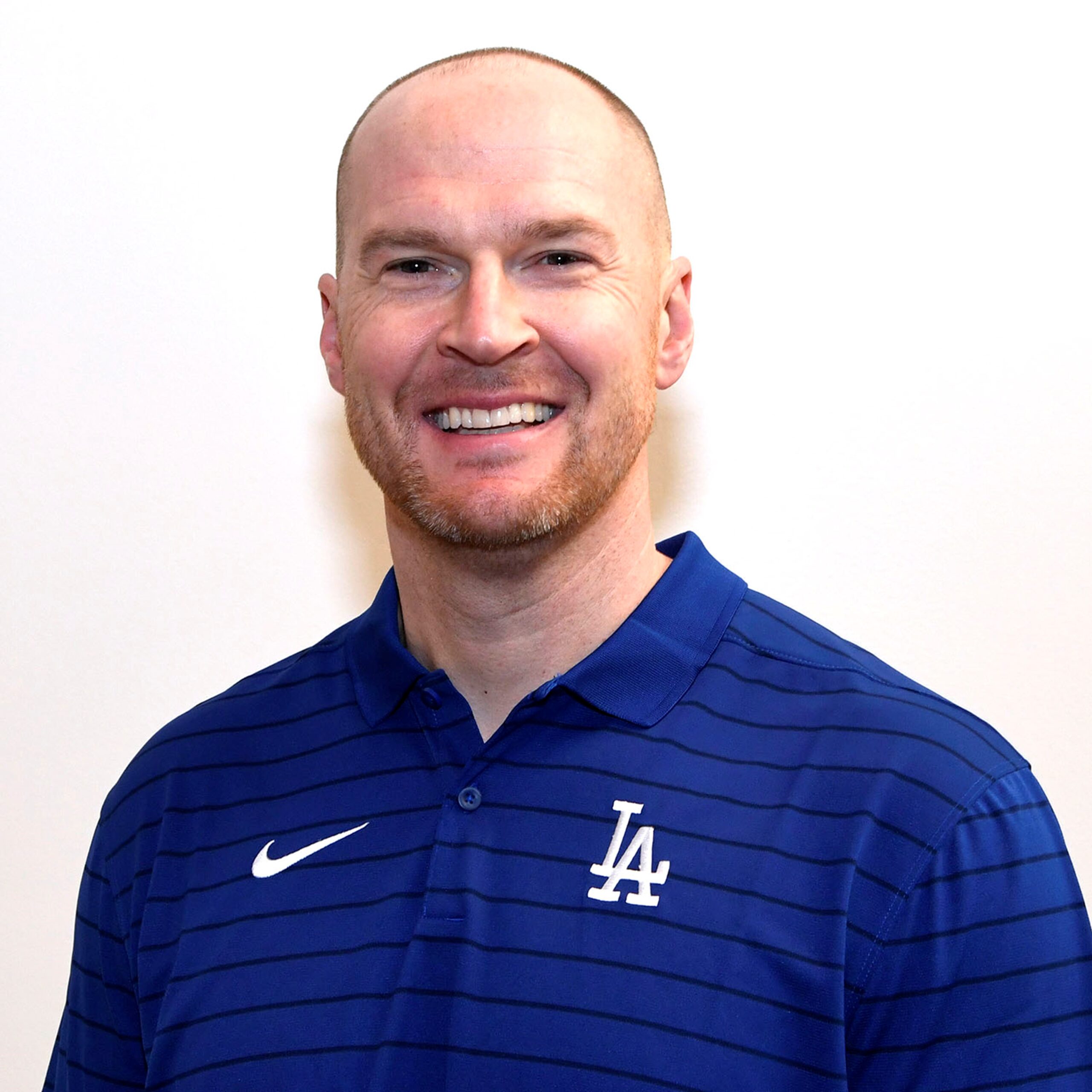
Troy Timney Los Angeles Dodgers Visiting Clubhouse Manager of the Year
